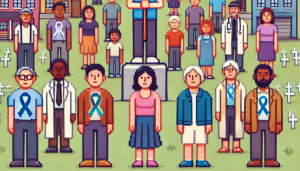
Decolonizing Global Health: Shifting Power and Redistributing Resources
In recent years, there has been a growing call to decolonize global health and humanitarian work. While political decolonization largely ended in the 20th century, many social, economic, and cultural hierarchies rooted in colonialism persist. These hierarchies shape today’s global health systems, creating an imbalance of power, resources, and knowledge between the Global North (wealthier nations) and the Global South (developing regions).
The need for practical, step-by-step guidance on how to address these inequities is clear, and a recent scoping review, offers a roadmap for decolonizing humanitarian health.
The Legacy of Colonialism in Global Health
Before diving into the solutions, it’s crucial to understand the problem. Historically, global health has been shaped by the colonial mentality of the Global North “rescuing” the Global South. Western ideas of progress, medicine, and scientific advancement dominated humanitarian efforts, marginalizing indigenous and local knowledge systems. Even today, the global health field often operates within these power structures, where high-income countries control the funding, decision-making, and even the research agenda. In contrast, lower-income countries remain in subordinate roles. As a result, interventions designed to improve health in the Global South are often disconnected from the realities on the ground.
Recent research by Amber Clark and team addresses this by highlighting the structural inequities within humanitarian health and offering practical ways to decentralize power and bring local voices to the forefront.
Key Themes for Decolonizing Global Health
Through an extensive review of 533 documents, this review identified five key areas where change can take place to decolonize global health and humanitarian work:
1. Organizational Structures and Engagement
One of the first steps organizations can take is reevaluating their internal structures and governance. Too often, leadership and decision-making roles are centralized in Global North offices, leaving little room for local experts to influence policies that directly impact their communities. Redistributing resources—including offices, leadership, and funding—to lower-income countries is crucial. By shifting power to in-country experts, organizations ensure that local voices guide humanitarian responses.
For example, the humanitarian organization IPAS recently transitioned from a single U.S.-based headquarters to a “networked model” where multiple independent offices are spread across the Global South. This decentralized structure allows each region to adapt strategies to local needs rather than following a top-down, Western-centric approach.
2. Research Partnerships
Another major issue is the imbalance of power in research partnerships. Often, research initiatives are designed and led by institutions in high-income countries with little input from local researchers or communities. Decolonizing research means involving local experts from the very beginning—allowing them to co-create the research questions, methodologies, and interventions.
To foster equitable partnerships, the review suggests focusing on “capacity strengthening” rather than “capacity building.” This subtle shift in language acknowledges that local communities already have the expertise—they don’t need to be “built up” but rather supported with resources that help them thrive.
3. Funding for Research and Projects
Who holds the purse strings matters. In most cases, the Global North controls the majority of research and project funding, often with strict criteria that prioritize Northern perspectives over local needs. One way to decentralize funding is by ensuring that local researchers and community organizations have a say in how funds are allocated and used. In other words, the people closest to the problem should help decide how resources are spent.
The researchers recommend changing the way risk is assessed in funding decisions. Smaller, grassroots organizations in the Global South are often excluded because they’re seen as “risky investments.” A more equitable approach would be to reframe these organizations as essential partners with invaluable local knowledge.
4. The Research Lifecycle
Decolonizing the research process itself—design, data collection, analysis, and dissemination—is another critical area. Too often, Global North researchers lead projects, collect data in the Global South, and then publish the findings in Western journals. This approach sidelines local voices and reduces the impact of the research on the communities being studied.
Instead, research teams should prioritize the meaningful participation of local researchers throughout the project lifecycle. Data should be collected in culturally appropriate ways, often in local languages, and the results should be shared with the community first. This approach helps ensure that research findings directly benefit the people who need them most, rather than just advancing academic careers in the Global North.
5. Teaching and Curriculum
Finally, the review argues that decolonizing global health starts in the classroom. Curriculums in global health and humanitarian studies need to be redesigned to include non-Western perspectives and to critically examine the legacy of colonialism in these fields. This involves not only changing the content of the courses but also creating inclusive learning environments where students from diverse backgrounds can share their experiences and ideas.
The review points to several toolkits, like the “Decolonizing the Curriculum” toolkit used at the London School of Hygiene and Tropical Medicine (will download a pdf), which offer practical steps educators can take to make their courses more inclusive and representative of global perspectives.
Practical Steps for Public Health Practitioners
For practitioners looking to decolonize their work, the review offers several concrete steps:
- Decentralize Decision-Making: Involve local experts in leadership roles and decision-making processes.
- Co-Create Research: Partner with local researchers from the very beginning and ensure they have equal say in the project’s direction.
- Fund Local Voices: Prioritize funding for local organizations and grassroots initiatives, and reframe risk assessments to be more inclusive.
- Disseminate Findings Locally: Ensure that research findings are first shared with the communities involved, not just published in Western journals.
- Rethink Education: Update global health curricula to include non-Western perspectives and foster more inclusive classroom environments.
Join the Conversation
What are your thoughts on decolonizing global health? Have you seen examples of successful decolonization efforts in your field? How can we, as public health practitioners, continue to shift power and resources to the communities most affected by our work?
Share your thoughts in the comments or on social media using the hashtag #DecolonizeGlobalHealth.
Join the Community – Get Your Weekly Public Health Update!
Be a health leader! Subscribe for free and share this blog to shape the future of public health together. If you liked this blog, please share it! Your referrals help This Week in Public Health reach new readers.



